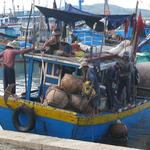Construing and constructing the South China Sea beyond state-led environmentalism: Vernacularizing geographical, geopolitical, and sociotechnical imaginaries of territory
During the 2010s, the South China Sea (SCS) became a geopolitical flashpoint over the sovereignty of the Paracels and Spratlys. China envisioned its transformation of coral reefs into military bases and island cities as an SCS ‘green construction’ project. This article analyses how the SCS is discursively construed and practically constructed as maritime national territory, by mobilizing fishing legacies and extending state limits through ‘state-led environmentalism’ rhetoric. Drawing on ethnographic fieldwork in China, I show that state-led environmentalism is a hierarchical process that intermittently co-opts and excludes local populations to advance the state’s territorial ambitions, which are anchored in geographical, geopolitical and socio-technical imaginaries of ‘maritime civilization’. Yet, I also show that in this process, the SCS emerges as spaces of vernacularized political claims. Thus, I argue that territory is not only a political technology of control but also vernacular practice through which universalizing discourses— whether on the Exclusive Economic Zone regime, sovereignty or nature—are adapted and modified.
Keywords: state-led environmentalism, imaginaries, maritime civilization, vernacularization, China, South China Sea
https://doi.org/10.1111/sjtg.12451





